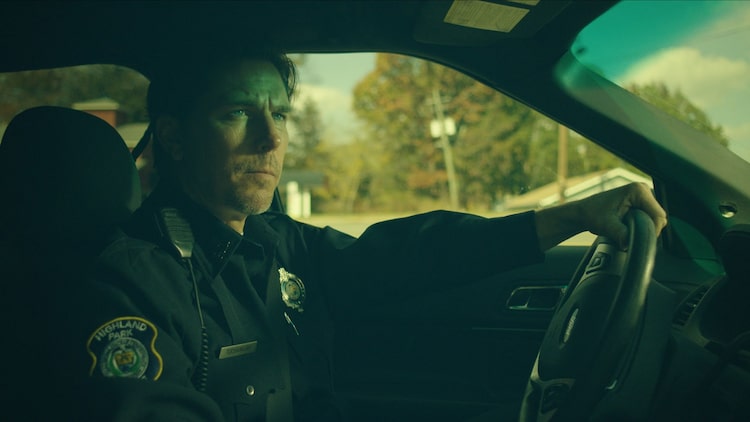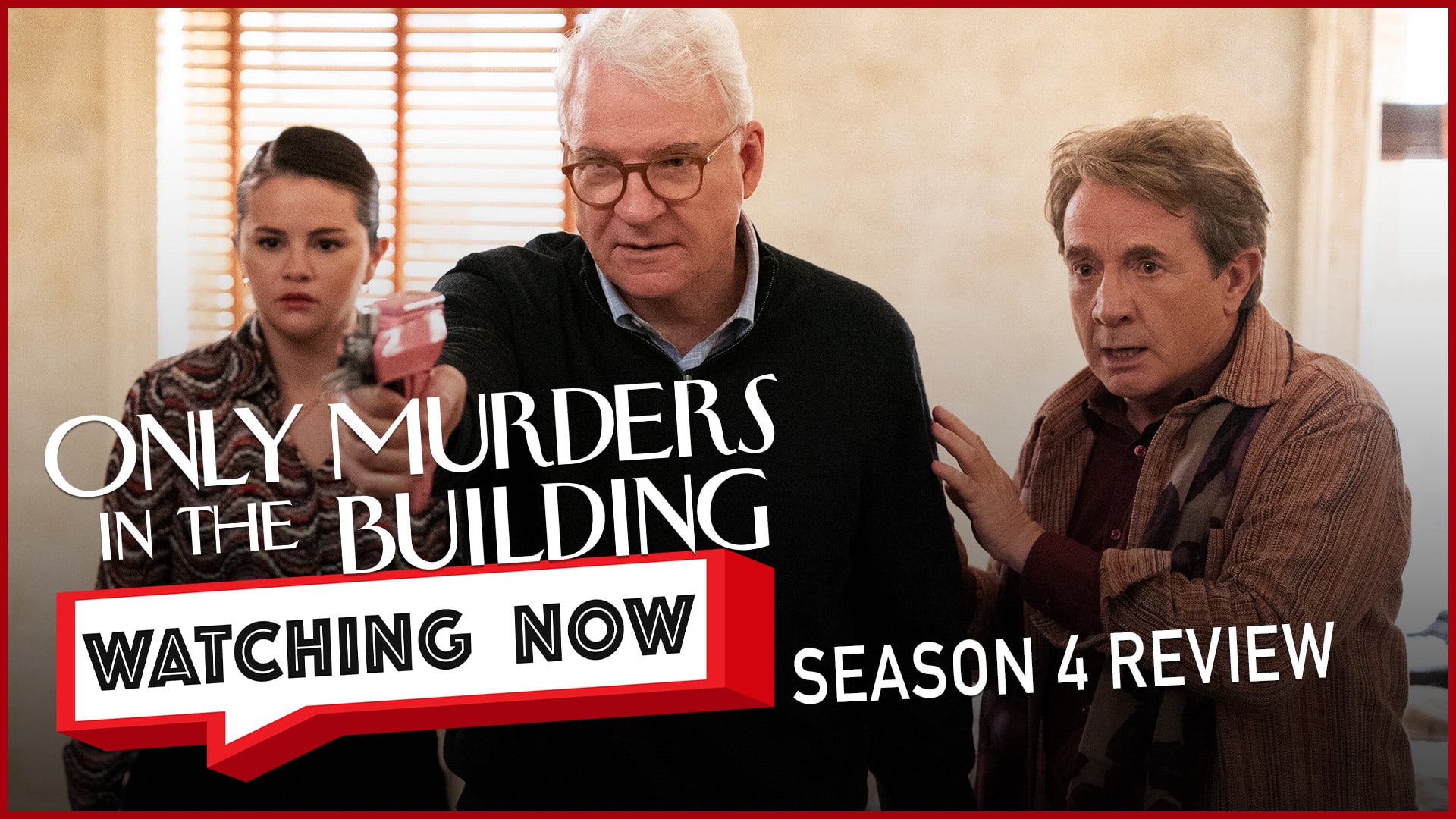
In Hollywood’s competitive landscape, few actors maintain the lasting impact and versatility that define Michael Trucco’s career. Recognized for his compelling performances in Battlestar Galactica, Midnight Mass, and The Fall of the House of Usher, Trucco has sustained his success through a blend of talent, business insight, and an unshakeable positive outlook.
In this exclusive sit-down interview with PJ Haarsma for Couch Soup, Trucco offers a candid look into his career philosophy, the critical role of collaboration, and how he measures success in an industry that often prioritizes the temporary and superficial. Whether you’re a dedicated fan or just discovering his work, this conversation provides a valuable perspective on the enduring career of one of Hollywood’s most respected actors.
PJ Haarsma: It’s great that we’re finally doing this. I’m super excited about the project we’re working on, Trick Films. I respect you on many levels—your professionalism and your business sense—for an actor, you’ve got a great business sense. My lawyer once told me, “Never get into business with an actor.” I thought, “No, no, no, this is going to work.”
Michael Trucco: He’s right.
PJ Haarsma: We’ve known each other for a while now. Our wives know each other. We’ve mostly hung out at social events, but we’ve never really talked deeply about what motivates you, where you are in your career, or your thoughts on the business process.
So, with that in mind, I’ve got five questions for you—not easy ones, no softballs. I’ll throw them at you one at a time.
Michael Trucco: I’m an open book. Hit me with your best shot.
PJ Haarsma: In the grand scheme of your career, how do you personally define success, and has that definition evolved over time?
Michael Trucco: That’s a good question. For me, success is measured in longevity. Pure and simple, I’m not a one-and-done guy. Some actors have that big moment in their career. They have that defining role. But that’s never really been my trajectory. I take joy in the longevity. I’m playing the long game. There’s this saying, “Nice guys finish last.” I think, great, that’s precisely where I want to be—the last guy standing. I like this game, and I want to be in it for a long time.
If you want a less esoteric answer, the definition of success as an actor is never having to audition again. Getting offers for roles is the ultimate sign of success, especially for someone like me who’s been in the game for a long time. You might have a great gig, a great run on a series, or a big movie, and then a week later, you’re back on the audition circuit. And that’s fine—I’ll never say never, I’m never above that process. But I gauge my success by reaching a point where I’m just getting offers. When a casting director, producer, or writer is putting together a series and thinks, “Michael Trucco would be great for this!” That, to me, is the greatest measure of success for an actor.

PJ Haarsma: I love that you didn’t give me a monetary amount. I wonder if that’s because we’re older now. Sometimes, when you talk to young people, success to them has a dollar figure.
Michael Trucco: Yeah, I think you’re right. Success for them might mean celebrity. I get asked questions from younger people, such as, “How did you get into the business? How do I get started?” And I say, “Do you want to be famous, or do you want to be an actor?” Because if you want to be famous, I’m the wrong guy to talk to. I don’t understand social media and all that. I use it, but I wasn’t raised with it. Celebrity and longevity in acting are mutually exclusive.
PJ Haarsma: Success in life says a lot about you as a person and how you achieve it. Some might argue it’s easy to make money—how you do it, that’s another story. Celebrity is the same way. You can become a celebrity, but to have longevity and be respected for what you do, I believe the money will follow.
Michael Trucco: Exactly. And that is the goal. I want to be respected for my work.
PJ Haarsma: So, what philosophical principles guide your decision-making process, both in life and in your work, like with Sandra and your family?
Michael Trucco: I think the overarching story of my life is that I’m a collaborator. I like being part of a creative team. If you want to talk about philosophies, I could run through the cliches: “What’s good for the goose is good for the gander,” “It takes a village,” and “Rising waters lift all ships.” They’re cliches for a reason—there’s truth in them. But I feed off the creative energy of my peers. That’s what I like about this business—it truly takes a village. Not many people know how many souls are involved in the production of a film, a TV series, a play, or an album. And I dig that world. I like being part of a creative team.
Years ago, I had a chance to direct an episode of television on a series I was doing. While you are taking the reins as the director, I got immense pleasure out of asking the department heads for their input. I’d say, “Here’s the shot, here’s what we’re doing today, and here’s what I want to achieve.” But then I’d ask, “Is this good for the camera department? For lighting? For wardrobe?” I want to carry that into this production company and my collaboration with you. I think we complement each other well because you bring a wealth of knowledge and experience in parts of this industry that I have absolutely no idea about.

PJ Haarsma: People don’t realize how many people it takes to be successful. Even in your friend group, it’s essential. In Hollywood, so many people rise in their friend group. You’ve got to like the people you’re collaborating with because you’re on set with them all day long. If I have advice for someone trying to break in, it’s to network and be a decent person.
Michael Trucco: That’s right. You get as good as you give. There’s a false perception that being the loudmouth, the asshole, or the diva is somehow celebrated or feared. But that’s a toxic behavior that used to be rewarded. Now, there’s been an evolution in this business and across every industry where we’re calling out the bullshit. We’re becoming less passive. I won’t suffer fools anymore. But I think that comes with age, PJ.
PJ Haarsma: Hollywood does turn a blind eye to power. If you’ve got the power, they cut you a long leash. But for people coming up in the business, it’s good to have your philosophical principles and stick to them, even if it means you might not get that work.
Michael Trucco: Exactly.
PJ Haarsma: We’ve both been doing this for a long time. You hear people talk about an overnight success, but these people have been working at it for 20, 30 years. I know in my journey, I’ve tried many things and failed. I move on. I try to teach my daughters that—fail often, fail fast, and then learn from that.
What role does failure play in your journey, and how do you reconcile with it to move forward?
Michael Trucco: Failure is a fickle friend. It carries a lot of negative connotations because you didn’t succeed. However, I learned something early on from a quote related to Thomas Edison’s quest to invent the light bulb. He said, “I have not failed. I’ve just found 10,000 ways that won’t work.” Failure is data; it’s knowledge. You can apply that to what you do as an actor.
There are reasons for failures that we have no control over. You can beat yourself up about it or say, “Okay, that didn’t work.” But the fact that it didn’t work shouldn’t stop you. Failure is inevitable, and you can learn from it once you realize it. The successful people are the ones who take the lesson and move on. I’ve embraced this philosophy, and it takes time and practice. But I have a deep-seated belief in my own success and self-worth.
It’s easy to talk a big game when things are going well. But when shit’s not going your way, that’s when you have to dig deep. Call it what you want—channeling, manifesting, meditation—but I tapped into something that gave me great confidence. Confidence is attractive and inspiring; cockiness is just arrogance and insecurity. When you’re self-confident, you put people at ease.
PJ Haarsma: I think the fear of failure leads to that false bravado and cocky demeanor. They try to set themselves up so they cannot be questioned. We see that today in our political arena, but we won’t go there.
Michael Trucco: Let’s not.
PJ Haarsma: That lack of self-confidence leads to constant self-doubt, even when they’re winning. It’s hell on earth.
Michael Trucco: You have to be willing to fail publicly and loudly, right in front of people. That means being on set, trying something, and when it doesn’t work, saying, “Well, that didn’t work,” but then moving on.
PJ Haarsma: Suck it up and move on. People give you more respect if you fail gracefully and move on than they will if you try to take everybody down with you and blame it on everyone else.
Michael Trucco: Exactly. I tend to get internal and introverted when I don’t want to put something out there because I’m almost certain it will fail. But I’ve gotten better in the last few years. I’ve become more proactive. It’s like when a musician shares a tune they wrote—I love the confidence that takes.
PJ Haarsma: Do you think perfectionism plays a role? We might be perfectionists and, therefore, don’t want to try, so we don’t even get the chance to fail.

Michael Trucco: Absolutely. That was my problem. I wanted everything to be perfect, and I didn’t want to accept the idea of failure. But I’m getting better at it. I’ve realized that this quest for perfection was keeping me from putting things out there. It’s like, “What if they hate it?” So what? Just put it out there.
PJ Haarsma: I’m drawn to art and storytelling. After a couple of glasses of wine at a party, I’m lamenting the plot points of my day. In your opinion, what’s the purpose of art and storytelling in our society?
Michael Trucco: Art in all its forms—dance, music, painting, television, film, photography, literature—are all storytelling mediums. To me, that’s what art is, telling a story. It all boils down to two simple things: expression and impression. It’s one person’s ability to express an emotion and elicit an equally powerful emotional reaction from the audience. Storytelling is as old as humankind.
Since we were Neanderthals, we’ve been telling stories. We’ve been etching drawings into the dirt, recounting our experiences. We’ve been telling stories for as long as we’ve been able to communicate. It’s probably one of the most important aspects of being human. We don’t cure cancer or solve global issues, but we provide an important part of the human discourse. Entertainment is essential, and the mediums have changed over time. But at the end of the day, we’re just telling a story—once upon a time.
That’s the foundation of Trick Films and partnering with you. If we can tell stories that elicit emotion from one person or a group of people and share that collective experience, that’s what drives me. As an actor, I want to give a performance that moves people.
PJ Haarsma: I agree. You started with Battlestar Galactica, so you understand the sense of community around a story. That Battlestar community is still big and strong. Although we don’t all share the same experiences, we do share the same array of emotions, fears, and hopes. Presenting those in a story form creates a connection with the person consuming the “art.” And thus, you start a community. You see that in religion, they used stories to explain things they couldn’t understand and built a community around those stories.
Michael Trucco: Absolutely.
PJ Haarsma: There’s no other definition of a fan base when you think about people who love a TV show, a movie, a band, or a novel. People are drawn to communities.

Michael Trucco: The collective experience. Sitting in an arena, listening to Lady Gaga at the piano, or Bruce Springsteen with just a guitar in a spotlight—that’s magic.
PJ Haarsma: For me, one of the worst things that’s happened to our industry since COVID is that so many people stopped going to the movie theaters. They’re watching everything from home — with a phone in hand — and missing the visual cues. They get the sound cues, but they’ve had their heads down. I hear people say they hated a movie, and then I find out they watched it on their phone. They’re missing that collective community experience.
Michael Trucco: Yeah, they miss that.
PJ Haarsma: I think many movies need to be experienced in the theater to be properly appreciated.
Michael Trucco: I could not agree more. Most media is consumed on phones or computers now, but that’s not the way to enjoy it. People go to live concerts, and there are 10,000 phones recording. That’s the Rolling Stones 70 feet in front of you—why are you staring at your phone screen? Who cares about the recording? That’s the thing. Who are you showing this for? Put your phone down and look.
PJ Haarsma: If I brought you a video of the Stones, you wouldn’t want to watch it. You’d want to be there.
Michael Trucco: Exactly. Enjoy the process, not the recording. That’s my rant.
PJ Haarsma: All right, one more question for you. Let’s get a little broader. What would it be if you could distill the essence of your life philosophy into a single piece of advice?

Michael Trucco: That’s a tough one. We talked about philosophy earlier. I’ve always had a motto I used to sign off letters or emails with. It’s simple: “Live love and love life,” or “Live the love and love the life.” Basically, give good and get good. That’s my motto. I’m an eternal optimist. I just want to leave this world a little better than I found it. So, live, love. Don’t fall into the hate, the toxicity, and the trolling. Stay the course. If you live love, you’re going to love life.
PJ Haarsma: The giving is important, too. The more you give, the more it comes.
Michael Trucco: Absolutely. Artistically, I’ve always loved the quote, “The possibilities of yes are always more interesting than the certainties of no.” That speaks more artistically than as an overall life experience. But as an artist, opening yourself up to the possibility of yes, makes your work infinitely more interesting.
PJ Haarsma: For younger people, as well. They get set in their ways fast, worried about how they look or making mistakes, and tend to say no before yes just to avoid looking bad. They’re too young to worry about that—say yes to everything right now.
Michael Trucco: We’re our worst judge. It’s easy to say, hard to practice.
PJ Haarsma: Especially when you get a trigger or something pops up, it’s hard – I may be on my diet, but when that pizza is served, I’ve got to eat it!
Michael Trucco: I mean, come on, it’s pizza.
PJ Haarsma: I’m really excited about what we’re doing. I’m pumped about Schoolboy. It’s some of the best stuff I’ve read since Con Man. I know you’ve got some things you’re working on. What do you have coming out next?

Michael Trucco: Average Joe is coming out on Netflix, and damn, it’s good. I don’t say that about everything I do, but Average Joe is something I wish more people had seen. Apparently, so did others, and they took notice. Netflix noticed and made a deal with BET Plus to run season one. That’s exciting because I think it will open it up to a whole other audience. We’re returning for season two, shooting in Cape Town, South Africa. I also have a recurring role on season two of Citadel on Amazon Prime with Priyanka Chopra, Richard Madden, and Stanley Tucci.
PJ Haarsma: You’re on fire right now. I loved what you did in The Fall of the House of Usher and Midnight Mass. My friends are still talking about those shows. You’ve been on a run, buddy.
Michael Trucco: I’ve been very fortunate to collaborate with some incredible geniuses like Mike Flanagan and the Russo brothers. And now, I’m working on Fire Country for CBS, and again, just incredible people. Just like we talked about before, the no-assholes policy. Everyone on Fire Country just loves their job, and it’s so refreshing to go to work in such a constructive atmosphere. I’m acutely aware of my good fortune and incredibly grateful.
PJ Haarsma: Here’s to a lot more with Trick Films. Thank you for doing this, buddy. I know the Couch Soup fans will love to read this.
Michael Trucco: Absolutely, my pleasure.




I feel like crying at the genius that is in this article. Well effing done. Inspirational, raw, true, and personal. Thank you for sharing!
So glad you like it. I feel Michael’s awesomeness shines through. He is such a remarkable human being.
What she said! He seems like a genuinely good dude who loves what he’s doing and enjoys sharing it with the world. Plus your guys’ friendship and partnership really shown through here, which makes this doubly awesome in my opinion.